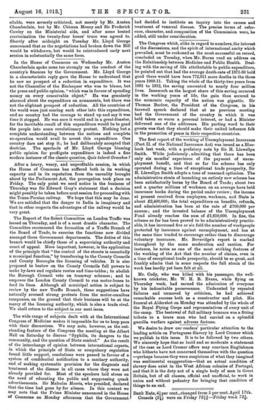In the House of Commons on Wednesday Mr. Austen Chamberlain
spoke none too strongly on the conduct of the country's finances by the Government. Mr. Lloyd George in a characteristic reply gave the House to understand that he saw no prospect of a reduction in expenditure. It was not the Chancellor of the Exchequer who was to blame, but the press and public opinion, " which was in favour of spending money on every conceivable object." He was genuinely alarmed about the expenditure on armaments, but there was not the slightest prospect of reduction. All the countries of the world were just scaring each other into this expenditure, and no country had the courage to stand up and say it was time it stopped. He was sure it would end in a great disaster, for the inevitable result of this expenditure would be to goad the people into some revolutionary protest. Nothing but a complete understanding between the nations and complete co-operation would avail to arrest this expenditure. One country dare net stop it ; he had deliberately accepted that doctrine. The spectacle of Mr. Lloyd George blaming public opinion for profligate expenditure is indeed a fine modern instance of the classic question, Quis tulerit Gracchos ?


































 Previous page
Previous page